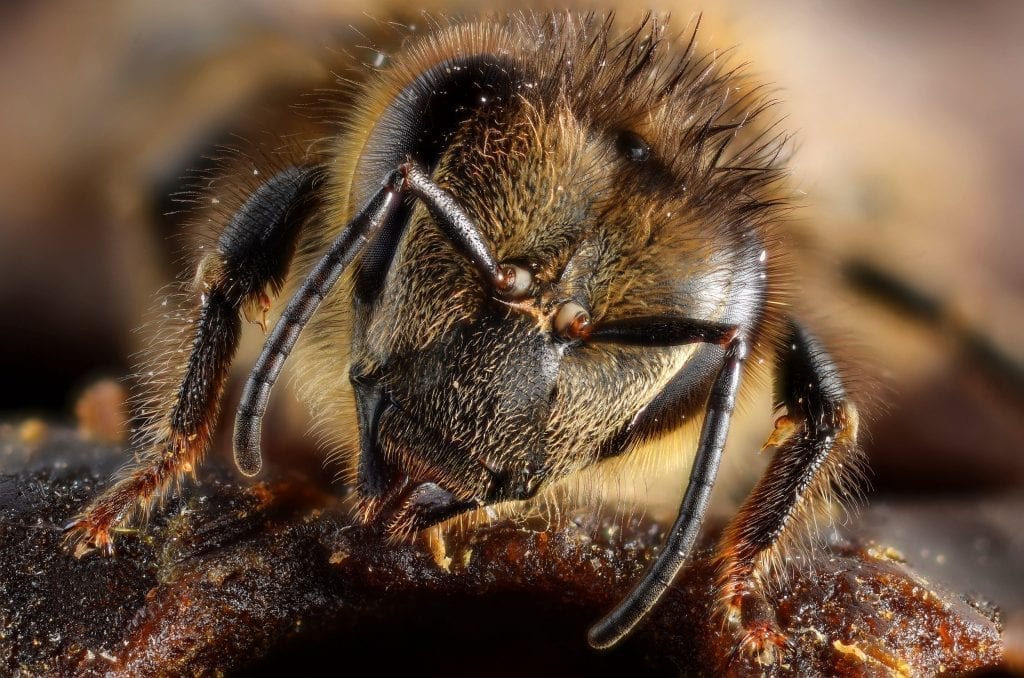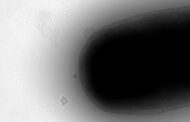
The humble honeybee: A million neurons of pure brain power
We’ve learned bees can understand zero and do basic maths, and now a new study shows their tiny insect brains may be capable of connecting symbols to numbers.
Researchers have trained honeybees to match a character to a specific quantity, revealing they are able to learn that a symbol represents a numerical amount.
It’s a finding that sheds new light on how numerical abilities may have evolved over millennia and even opens new possibilities for communication between humans and other species.
The discovery, from the same Australian-French team that found bees get the concept of zero and can do simple arithmetic, also points to new approaches for bio-inspired computing that can replicate the brain’s highly efficient approach to processing.
The RMIT University-led study is published today in Proceedings of the Royal Society B.
Associate Professor Adrian Dyer said while humans were the only species to have developed systems to represent numbers, like the Arabic numerals we use each day, the research shows the concept can be grasped by brains far smaller than ours.
“We take it for granted once we’ve learned our numbers as children, but being able to recognise what ‘4’ represents actually requires a sophisticated level of cognitive ability,” Dyer said.
“Studies have shown primates and birds can also learn to link symbols with numbers, but this is the first time we’ve seen this in insects.
“Humans have over 86 billion neurons in our brains, bees have less than a million, and we’re separated by over 600 million years of evolution.
“But if bees have the capacity to learn something as complex as a human-made symbolic language, this opens up exciting new pathways for future communication across species.”
Mini brains, maximum potential: what the bees learned
Studies have shown that a number of non-human animals have been able to learn that symbols can represent numbers, including pigeons, parrots, chimpanzees and monkeys.
Some of their feats have been impressive – chimpanzees were taught Arabic numbers and could order them correctly, while an African grey parrot called Alex was able to learn the names of numbers and could sum the quantities.
The new study for the first time shows that this complex cognitive capacity is not restricted to vertebrates.
The bee experiment was conducted by Dr Scarlett Howard, formerly a PhD researcher in the Bio Inspired Digital Sensing-Lab (BIDS-Lab) at RMIT and now a fellow at the Research Center on Animal Cognition, University of Toulouse III – Paul Sabatier, CNRS.
In a Y-shaped maze, individual bees were trained to correctly match a character with a number of elements.
They were then tested on whether they could apply their new knowledge to match the character to various elements of the same quantity (in the same way that ‘2’ can represent two bananas, two trees or two hats).
A second group was trained in the opposite approach, matching a number of elements with a character.
While both could grasp their specific training, the different groups were unable to reverse the association and work out what to do when tested with the opposite (character-to-number or number-to-character).
“This suggests that number processing and understanding of symbols happens in different regions in bee brains, similar to the way separate processing happens in the human brain,” Howard said.
“Our results show honeybees are not at the same level as the animals that have been able to learn symbols as numbers and perform complex tasks.
“But the results have implications for what we know about learning, reversing tasks, and how the brain creates connections and associations between concepts.
“Discovering how such complex numerical skills can be grasped by miniature brains will help us understand how mathematical and cultural thinking evolved in humans, and possibly, other animals.”
Studying insect brains offers intriguing possibilities for the future design of highly efficient computing systems, Dyer said.
“When we’re looking for solutions to complex problems, we often find that nature has already done the job far more elegantly and efficiently,” he said.
“Understanding how tiny bee brains manage information opens paths to bio-inspired solutions that use a fraction of the power of conventional processing systems.”
Learn more: Bees can link symbols to numbers: study
The Latest on: Communication across species
[google_news title=”” keyword=”communication across species” num_posts=”10″ blurb_length=”0″ show_thumb=”left”]
via Google News
The Latest on: Communication across species
- Only Found In Southeastern Tasmania, The Red Handfish Is The Rarest Fish In The World And Actually Propels Itself Across The Ocean Floor As Opposed To Swimmingon April 25, 2024 at 10:00 am
The rarest fish in the world is the red handfish, a species that uses their “hands” to propel them across the ocean floor instead of swimming. Red handfish can only be found in two small patches of ...
- A Glowing Review: Meet the Museum Scientist Who Studies the Evolution of Bioluminescence in Coralson April 24, 2024 at 11:04 am
Deepwater coral specialist Andrea Quattrini’s new paper pins the origin of bioluminescence in corals to more than 500 million years ago ...
- Postpartum depression after adolescent stress shows a dysregulated HPA axis: a cross-species translational studyon April 24, 2024 at 7:14 am
Similar to the mouse results, the researchers found that childhood or adolescent stress significantly impacted HPA axis dysregulation and postpartum depression in a study of 116 women.
- Bioluminescence Is at Least Half a Billion Years Oldon April 23, 2024 at 8:01 pm
The oldest DNA yet found is about 1 million years old and came from mammoth remains on Wrangel Island, where the animals held out until about 4,000 years ago. The oldest glowing octocorals were much, ...
- First glowing animals lit up the oceans half a billion years agoon April 23, 2024 at 5:00 pm
Family tree of ‘octocorals’ pushes origin of bioluminescence back to 540 million years ago, when the first animal species developed eyes.
- In Coral Fossils, Searching for the First Glow of Bioluminescenceon April 23, 2024 at 4:01 pm
A new study resets the timing for the emergence of bioluminescence back to millions of years earlier than previously thought.
- 'Incredible' Clip Shows Scientist and Octopus 'Communicating' in the Wildon April 21, 2024 at 2:00 am
Underwater footage of an "incredible" moment shows a marine biologist seemingly communicating with an octopus as she hunts for crabs. The images, which were shot in the waters of the Great Barrier ...
- Oxidant pollutant ozone removes mating barriers between fly species, study findson April 10, 2024 at 5:00 pm
Insect pheromones are odor molecules used for chemical communication within a species. Sex pheromones play a crucial role in the mating of many insects. Species-specific odors attract males and ...
- How Plants Communicate: The Hidden Network Beneath Our Feeton April 10, 2024 at 5:00 am
Far from a silent and solitary existence, trees and plants within a forest are part of a bustling community where information travels in chemical languages unknown to many until recently. Research ...
- Spider conversations decoded with the help of machine learning and contact microphoneson April 2, 2024 at 7:51 am
After millions of years of evolution, many species rely on fancy footwork to communicate everything from ... extremely hard-to-detect movements across woodland substrates. Choi spent two ...
via Bing News







